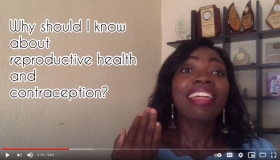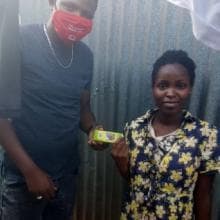Empowering Her, Health for All

- Health at Bayer
-
Pharmaceuticals
- Treatment Areas
- Innovation & Technologies
- Cell and Gene Therapy
-
Sustainability
- Patient Access Charter
- Leadership Perspective
- Strengthening Healthcare Access
- Moving Non-Communicable Diseases Care Forward
- Ensuring a Sustainable Product Supply
- Delivering Better Cancer Care
-
Empowering Women, Globally
- Boosting Family Planning Usage through Digital Channels
- Capacity building: Addressing Root Causes through Partnerships
- Impact at Scale: The Challenge Initiative
- Promoting Awareness: World Contraception Day (WCD) & the Your Life Campaign
- Providing Accessible and Affordable Contraceptives
- Enabling Family Planning in Humanitarian Settings
- Fighting Neglected Tropical Diseases
- Transparency
- News & Stories
- Personal Health
- Report a Side Effect
- Medical Counterfeits
In partnership with The Challenge Initiative (TCI), we are proud to share stories that illustrate the positive impact that family planning has on women and low-income communities around the world. Published monthly, these stories aim to capture the perspectives of women and their communities that benefit from TCI’s efforts and the dedicated individuals working to empower women with access to family planning.
How Family Planning Services Thrive Against All Odds
 Meet Chinenye Ikeobi from Nigeria. At the beginning of the pandemic, Chinenye decided to use her YouTube channel to bring sexual and reproductive health (SRH) messages to young people. It created the opportunity to communicate with peers despite social distancing. Chinenye's warm tone helped her viewers overcome potential awkwardness around the discussion of sexual and reproductive topics. In one video, she playfully states that she will be "spilling the tea regarding reproductive health".
Meet Chinenye Ikeobi from Nigeria. At the beginning of the pandemic, Chinenye decided to use her YouTube channel to bring sexual and reproductive health (SRH) messages to young people. It created the opportunity to communicate with peers despite social distancing. Chinenye's warm tone helped her viewers overcome potential awkwardness around the discussion of sexual and reproductive topics. In one video, she playfully states that she will be "spilling the tea regarding reproductive health".

YouTube Channel.
Chineye’s efforts are just one example of the creativity TCI workers and partners utilized to continue safely offering SRH resources and information to their communities amid a global pandemic. While parts of the world are moving closer to post-pandemic "normalcy", the impact of Covid-19 continues to be felt across the public health landscape. Notably, the recent social restrictions and life alterations created gaps in the availability and effectiveness of family planning programs and resources. Especially in low- and middle-income countries (LMICs), women and girls who already face a high risk of unplanned pregnancy are now confronted with even more challenges. Access to communities, public health officials and regional leaders became more restricted. That’s when TCI came to realize that creative, non-traditional approaches were key to continuing family planning programs and engaging with those who rely most on its services.
Take Ouagadougou in Burkina Faso as an example, a city of large trees and modern public buildings, with beautiful traditional residential neighborhoods. Despite the well-established family planning services in this modern city, the pandemic changed public health priorities. It became apparent that local family planning services needed more governmental assistance during these times. TCI stepped in to support. The city decided to increase its investment in family planning funding by 57 percent. This meant greater health benefits for the community, and even economic returns. By working together, they helped women avoid unplanned pregnancies, a contributing factor to poverty in the country.
Even as health services started to resume across Africa, many people remained hesitant to visit healthcare providers due to possible risks of contracting Covid-19. Also here, TCI tackled this challenge by combining Covid-19 testing with family planning services in many communities. This approach has limited the number of visitors and has decreased the number of interactions between the visitors and healthcare providers. And yet it helps community members as they obtain information and support for both services at the same time. TCI is also working with local leaders across Africa to shift communication channels to WhatsApp and local radio stations to inform audiences on the available family planning options. The combination of these creative solutions allowed for maximum services with minimal and safe contact.
Now, let’s take a look at Nairobi, Kenya. A similar resourceful approach enabled access to contraceptives and better engagement with local female youth during the pandemic. In 2019, Kenya had 380,000 teen pregnancies, many resulting from unavailable SRH education and services. Gideon Obuya soon realized that teen pregnancies would most likely increase and become harder to handle during the pandemic and decided to create safe ways to deliver contraceptives to young people in his community. Obuya, a media coordinator for the Nairobi Chapter of TCI's Youth Advisory Council (YAC), explained: "The local community in Dagoretti Sub-County expressed gratitude, telling me 'Thanks for [providing me with] the [contraceptive] pill! It will really help me, especially because I do not feel comfortable going to the facility at the moment because of Covid-19'". And with the right information and support, locals are helping each other via word-of-mouth. Obuya added that the young women also share information with their friends on where to pick up birth control during the pandemic.

Finally, ‘in with the new’ doesn’t necessarily mean ‘out with the old’. TCI also continued with key pre-pandemic activities, alleviating pressures on Covid-19-related family planning challenges. For example, even before the pandemic, TCI prioritized encouraging women to opt for intrauterine devices (IUDs) and other long-acting reversible contraceptives (LARCs). This proactive preventive action paid off as the pandemic aggravated, with 40 percent of women in Kenya having already adopted LARCs by mid-2020. Additionally, health organizations ensured continuity by allowing the prescription of self-administered birth control methods, such as ‘the pill,’ with a phone call or virtual visit.

Kojo Lokko, Executive Director of TCI, explained: ‘’Ultimately it is a range of factors that have allowed us and these respective communities to adapt. The youth are reaching out to each other, using new channels that are available to them, like social media. Investments were also increased rather than decreased by some local communities, which made a huge difference. Family planning options and Covid-19 testing were brought together, to create a better support system for communities. Communications also shifted, to channels like WhatsApp and local radio, to have a greater outreach. And education is playing a big role, from individual to individual but also from community to community. Plus, we have some good things going already, like pushing forward with the LARCs.’’
In short, a lot is being done through new channels, creative thinking and ongoing support. Learn more in the next article about digital health activities that are making a difference!












